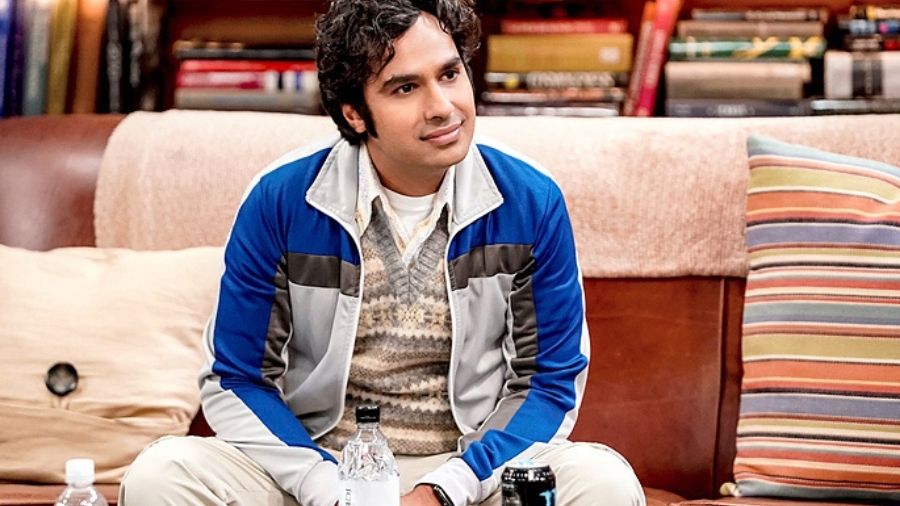Elusive dream
Sir — India is among the most ethnically and culturally diverse countries in the world. At a time when there is much discussion on diversity, it is a shame that the Western media still adhere to age-old stereotypes. Indian men are often depicted as nerdy with heavy-accents — think of Raj (picture) from The Big Bang Theory — while women are exoticized and overly-sexualized. Even the most basic research that can be done from Wikipedia seems to be too hard for Western content creators. Bridgerton, a popular show on Netflix, recently confused Hindi with Hindustani. While it is encouraging that Indian characters have made a place for themselves in Hollywood, the dream of inclusivity is far from being realized.
Sneha Ghose, Calcutta
Robust ties
Sir — The India visit of the British prime minister, Boris Johnson, yielded several positive outcomes (“Charm works”, April 25). Johnson and his Indian counterpart, Narendra Modi, promised to strengthen the relationship between the two countries when it comes to defence and technology to fight climate change. Johnson even announced commercial deals worth one billion pounds. The ongoing efforts to sign a historic free-trade agreement with the United Kingdom will provide a much-needed fillip to India’s exports. Significantly, unlike other world leaders, Johnson steered clear of exerting pressure on India to take a clear stand on the Ukraine war. In doing so, Johnson respected India’s autonomy. One hopes that this cordial relationship can be sustained by both nations.
M. Jeyaram, Tamil Nadu
Sir — The Shiv Sena has alleged that on the one hand, the Bharatiya Janata Party glorifies Mahatma Gandhi’s killer, Nathuram Godse, and on the other, foreign dignitaries are taken to the Sabarmati Ashram to weave yarn. The jibe came after the British prime minister visited the Sabarmati Ashram during his trip to India. Indeed, the BJP only brings up Gandhi in order to cash in on his image as a global icon of unity. This public embrace of Gandhi is belied by the communal violence perpetrated by Hindutva goons. The Sena has rightly called out the double standards of the saffron party.
Jang Bahadur Singh, Jamshedpur
Speedy justice
Sir — The Chief Justice of India, N.V. Ramana, has cautioned against seeking instant justice, saying that real justice would become a casualty in the process. Given the fast-paced lives we lead, it is not surprising that people assume that justice too would be instant. But certain social realities must be kept in mind in this respect. There are several factors that affect the justice delivery system. Expensive and lengthy judicial procedures and the lack of resources at the disposal of poor litigants delay the process of delivering justice. While justice cannot be instant, these issues must be addressed in order to improve the functioning of the judiciary.
Arun Gupta, Calcutta
Grave omission
Sir — It is disheartening that the Central Board of Secondary Education has dropped chapters pertaining to Islamic history and “poverty and infrastructure” from the syllabi of Classes XI and XII (“Rise of Islam out of CBSE texts”, April 24). The changes were made according to the recommendations of the National Council of Educational Research and Training. The decision to exclude these sections reeks of prejudice. The NCERT seems to be toeing the line drawn by the current political dispensation. Omitting segments like ‘The Rise of Islam’ and ‘The Mughal Era’ would not only deprive students of knowledge about key historical developments but also keep them in the dark about India’s secular origins. The CBSE must rethink its decision at once.
Iftekhar Ahmed, Calcutta
Power tussle
Sir — The Tamil Nadu government has passed two bills that will take away the governor’s power to select and appoint vice-chancellors of the state-run universities (“TN seeks right to pick VC”, April 27). The move is not unexpected given the tense relationship between the M.K. Stalin-led Dravida Munnetra Kazhagam government and the governor, R.N. Ravi. The latter has been accused of dragging his feet on several important bills, such as the one against NEET, since the DMK came to power last year. However, a bill that allows states to appoint VCs may not be prudent. It must be ensured that these appointment remain free from political influences.
Khokan Das, Calcutta
Inhuman practice
Sir — It is unfortunate that even after the legal abolition of manual scavenging, this dehumanizing practice continues to claim lives of sewage workers. According to the National Commission for Safai Karamcharis, on an average, one sanitation worker dies every five days. Such grim statistics expose governmental apathy. This is the situation in spite of the fact that the Supreme Court had rapped the Centre for failing to provide protective gear to and improve the working conditions of safai karmacharis. The fact that 97 per cent of manual scavengers are Dalits shows that casteism is rampant even 75 years after Independence. It is high time we ensure a life of dignity for sanitation workers.
Abhijit Roy, Jamshedpur
Parting shot
Sir — India is experiencing its hottest summer in decades. West Bengal is boiling amidst a heatwave. Construction workers and homeless people are the worst sufferers. Outdoor activities should be kept to a minimum in the afternoon. Water and sherbet should be distributed free of cost on the streets.
Suparni Haldar, Calcutta










